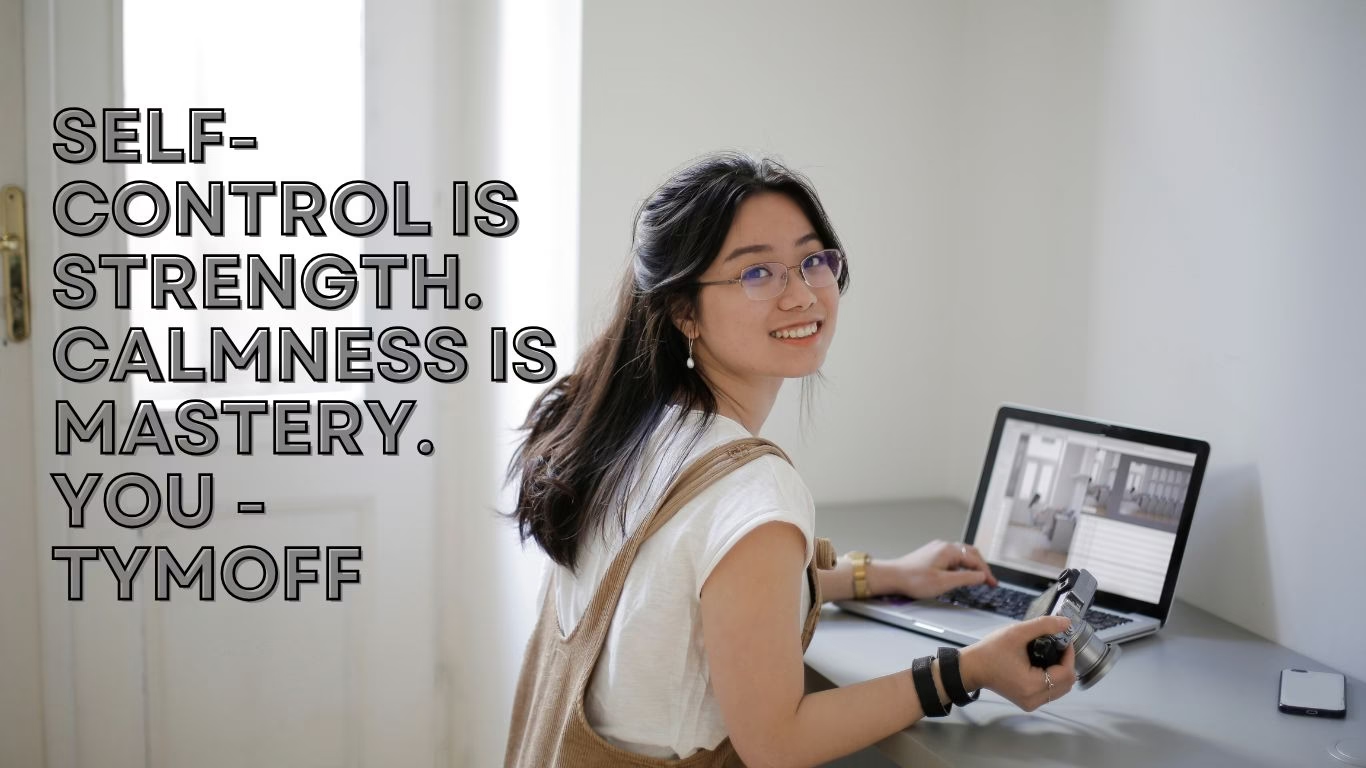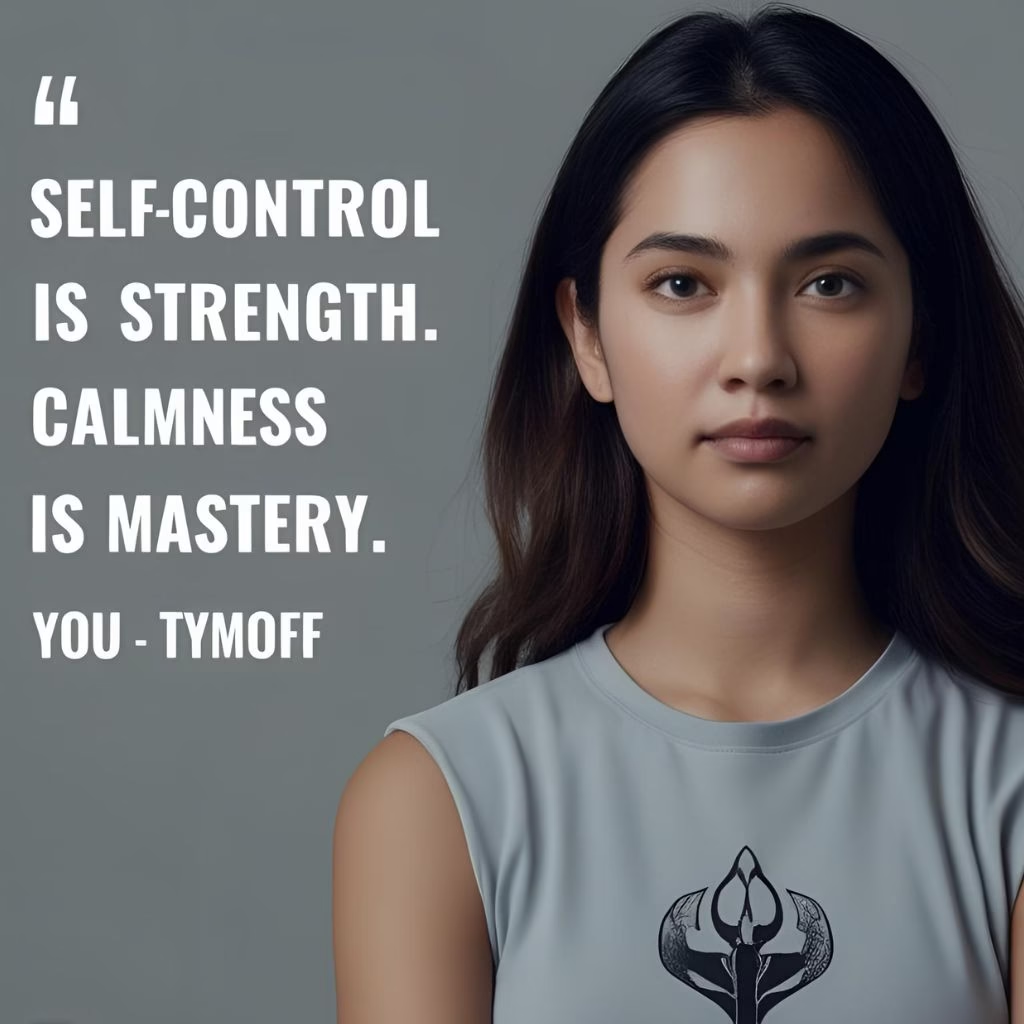Self-control is Strength. Calmness is Mastery. You – Tymoff

There’s a reason the quote “Self-control is Strength. Calmness is Mastery. You – Tymoff” has resonated with so many people lately. It’s simple, but its message is profound. When I first came across it, I remember thinking, Wow, that’s exactly what I needed to hear today.
In a world where stress, distractions, and emotional triggers are part of our daily lives, learning how to stay calm and in control feels like a superpower. This quote isn’t just about being emotionally steady—it’s about discovering the inner strength that allows you to live intentionally, think clearly, and navigate challenges gracefully.
Whether you’re dealing with personal struggles, professional pressure, or just trying to be a better version of yourself, cultivating self-control and calmness can transform your life.
Why Self-Control and Calmness Matter in Personal Development?
Think of your mind as a garden. Self-control is the discipline to keep out the weeds, and calmness is the steady hand that nurtures your growth. Together, they help you make better choices, avoid unnecessary conflict, and stay focused on what truly matters.
The truth is, real growth doesn’t happen in chaos—it happens when we have the emotional discipline to pause, reflect, and move forward with intention.
These traits are the backbone of personal development. Without them, motivation fades, emotions take over, and we end up drifting instead of directing our lives.
Understanding Self-Control: What is Self-Control?
Self-control is the ability to regulate your thoughts, emotions, and actions, especially in the face of temptation or challenge. It’s not about being robotic or emotionless—it’s about maintaining control so you can choose your response, instead of letting your impulses take the wheel.
Psychologists Roy Baumeister and Kathleen Vohs introduced the strength model of self-control, which compares self-control to a muscle. Like any muscle, it can get tired with overuse—but it also grows stronger the more you exercise it.
Why It’s So Valuable
Here’s why developing self-control is a game-changer:
- It teaches patience, even when you’re frustrated or things aren’t going your way.
- It helps with emotional regulation, so you can manage anger, anxiety, or sadness without spiraling.
- It improves your focus, allowing you to stick with long-term goals and tune out distractions.
- It enhances decision-making, helping you choose what’s right over what’s easy.
The more you practice it, the more confident you become in your ability to stay grounded—no matter what life throws at you.
Cultivating Self-Control
Okay, now that we understand what self-control is and why it matters, let’s talk about how to develop it in your everyday life.
1. Set Clear Goals
Clarity is key. When your goals are vague, it’s easy to drift or give in to distractions. Define your goals with intention—whether it’s eating healthier, building a new habit, or improving your relationships.
2. Avoid Temptations
Make the right choice the easy choice. If your phone pulls you away from work, keep it in another room. If late-night snacking is your kryptonite, don’t stock junk food in the house. Your environment matters more than you think.
3. Practice Mindfulness and Meditation
Mindfulness is one of the best ways to train your brain to pause instead of react. Even a few minutes of breathing or meditation each day can help you stay centered and aware of your thoughts.
4. Develop Healthy Habits
Small, consistent actions build mental discipline. Wake up at the same time. Stick to a bedtime. Prep your meals. These routines lay the foundation for better self-control across every area of life.
5. Keep Learning
Knowledge reinforces discipline. Read books about habits and focus, listen to self-development podcasts, or follow mentors who inspire you. Continuous learning keeps your mind sharp and your motivation alive.
Embracing Calmness: What is Calmness?
Calmness isn’t the absence of emotion—it’s the ability to stay centered and composed when emotions are running high. It’s the quiet voice inside that says, You’ve got this, even when everything feels overwhelming.
And the beautiful thing about calmness? It’s not something you’re born with—it’s something you learn and practice.
Calmness as a Tool for Self-Control
Self-control and calmness go hand in hand. When you’re calm, you can think clearly, assess situations rationally, and make decisions that align with your values. Calmness allows you to create space between the trigger and your reaction. That space is where growth happens.
Ever notice how it’s easier to stay in control when you’re not stressed? That’s because calmness makes self-control easier to access—and vice versa.
The Benefits of Being Calm
There are so many incredible benefits to embracing calmness:
- Less stress: Your body and mind stay relaxed, even in difficult situations.
- Better relationships: You communicate more clearly and listen more deeply.
- Smarter decisions: You’re not ruled by your emotions—you respond with clarity and confidence.
Being calm doesn’t mean being passive. It means being deliberate, thoughtful, and in control of your inner world.
Mastering Calmness
Let’s be real: staying calm isn’t always easy. When life feels chaotic, our first instinct is often to react—to snap, stress, or spiral. But mastering calmness means learning how to create stillness within, even when the world around you feels stormy.
The good news? Calmness isn’t something reserved for monks or yogis. You can absolutely learn to cultivate it in your own life. Here’s how:
1. Mindfulness Practices
Practicing mindfulness helps you become aware of your thoughts without getting swept away by them. Whether it’s through meditation, breathwork, or simply pausing for a few moments during the day, mindfulness is one of the most powerful tools for staying calm and grounded.
2. Prioritize Sleep and a Healthy Diet
It’s hard to stay calm when you’re running on empty. Lack of sleep and poor nutrition mess with your emotions, focus, and patience. A well-rested, well-nourished body makes it easier to keep your cool—even in stressful situations.
3. Move Your Body
Regular exercise releases endorphins, reduces anxiety, and improves mood. Whether it’s yoga, walking, or dancing in your kitchen, moving your body is one of the easiest ways to reset your nervous system.
4. Spend Time in Nature
Nature has this magical ability to ground us. A walk in the park, sitting under a tree, or listening to the sound of waves can instantly bring a sense of calm and clarity. Make time for these moments—they truly help.
5. Let Go of Negative Emotions
Holding onto anger, resentment, or frustration only creates inner tension. Learning to acknowledge, process, and release those emotions is key to finding lasting calm. Journaling, therapy, and forgiveness practices can help you with this journey.
Interplay Between Self-Control and Calmness
Here’s where it all comes together. Self-control and calmness don’t just support each other—they strengthen each other. One naturally leads to the other, creating a powerful, positive loop.
Think about it: when you practice self-control, you create space between impulse and action. That space is where calmness can grow. And when you’re calm, it’s so much easier to maintain self-control.
Together, they create a synergistic effect that supports personal growth. You become more intentional, more reflective, and more capable of handling life’s curveballs with grace.
It’s like tuning a guitar—self-control is tightening the strings, and calmness is the harmony that results. The better you get at both, the more balanced and resilient you become.
Impact on Health and Well-Being
These qualities don’t just help with emotional control—they also have a profound effect on your physical and mental health.
Physical Health Benefits
Chronic stress can take a toll on your body, leading to headaches, fatigue, high blood pressure, and more. But when you consistently practice calmness and self-control, your nervous system gets a break. You sleep better, digest food better, and even reduce your risk of long-term illness.
Emotional Stability and Resilience
Developing emotional resilience means you can bounce back faster from setbacks. Instead of being consumed by stress or disappointment, you’re able to take a step back, regulate your emotions, and move forward with purpose.
Enhanced Mental Clarity and Focus
Calmness and self-control help clear the mental clutter. You make better decisions, stay more focused, and experience less mental fatigue. This means you can think even under pressure—a skill that’s useful in every part of life.
Influence on Relationships and Communication
Our ability to stay calm and in control doesn’t just affect us—it also changes the way we connect with others.
Building Trust and Empathy
When you’re emotionally grounded, people feel safer around you. They trust your consistency, appreciate your thoughtfulness, and feel understood. Calm, emotionally intelligent people are often seen as reliable and compassionate leaders, friends, and partners.
Effective Conflict Resolution
Arguments and disagreements are part of life, but calmness and self-control are what allow us to resolve conflict without causing harm. You listen better, communicate more clearly, and avoid saying things you’ll later regret.
Improved Interpersonal Interactions
Whether you’re navigating a tough conversation, comforting a loved one, or collaborating at work, emotional regulation helps you respond with intention rather than react impulsively. That changes everything.
Practical Applications in Daily Life
You might be wondering, This all sounds great… but how do I use this in real life?
The truth is, self-control and calmness aren’t just ideas—they’re daily habits. Let’s look at how you can apply them in the real world.
Handling Everyday Stress
Running late? Missed a deadline? Unexpected bill?
Instead of reacting with panic or frustration, pause and breathe. Self-control helps you avoid snapping, while calmness lets you respond with clarity. This shift turns overwhelming situations into manageable moments.
Navigating Conflict
Whether it’s a disagreement with a partner or tension at work, staying calm allows you to listen, empathize, and speak with intention. Self-control keeps you from saying something you’ll regret. That combo creates space for solutions, not just reactions.
Overcoming Setbacks
Let’s be honest—life isn’t always smooth. You’ll face setbacks, failures, and roadblocks. But with self-control, you resist the urge to give up, and with calmness, you maintain a clear perspective. These two traits together help you bounce back stronger every time.
Staying Motivated and Consistent
Motivation comes and goes, but self-control helps you stay consistent even when you don’t feel like it. Calmness helps reduce burnout and keeps you from being overwhelmed. Whether it’s going to the gym, pursuing a goal, or developing a new skill, these traits help you stick with it.

Conclusion
We’ve talked about a lot today, so let’s bring it all together.
“Self-control is Strength. Calmness is Mastery. You – Tymoff” is more than just a quote—it’s a powerful reminder that true power doesn’t come from force or control over others. It comes from mastering yourself.
By developing self-control, you build the foundation for wise choices, emotional balance, and consistent growth. By embracing calmness, you create the inner stillness that allows you to navigate life’s chaos with clarity and compassion.
These traits aren’t about perfection. They’re about progress. You’ll mess up sometimes. We all do. But the more you practice, the more these qualities become second nature.
So, take a deep breath. Start small. Stay steady. Your strength is already within you.
For more info, Stay tuned with locationtrap.com





